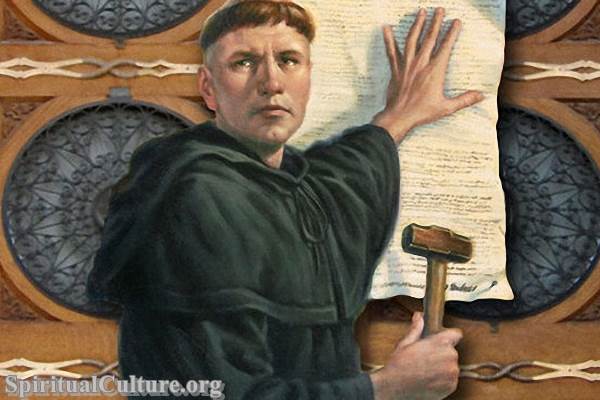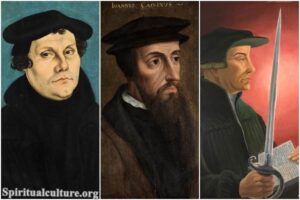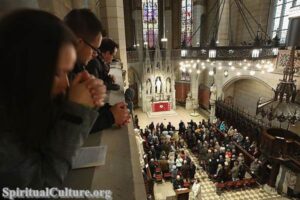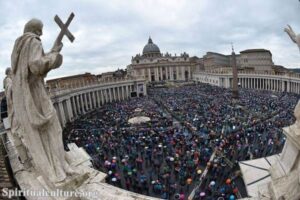Martin Luther was a German monk and theologian widely regarded as the father of the Protestant Reformation.
In the early 16th century, Luther challenged the authority of the Pope and the Catholic Church by advocating for the idea that the Bible is the supreme authority in matters of faith and that people can achieve salvation through faith in Jesus Christ alone rather than by performing good works or by purchasing indulgences. These ideas are known as “sola scriptura” (by scripture alone), “sola fide” (by faith alone), and “priesthood of all believers.”

Here is a bit more detail on the three main ideas of Martin Luther:
Sola Scriptura
Sola Scriptura is a principle upheld by Martin Luther and other Protestant Reformers, which asserts that the Bible is the ultimate authority in matters of faith and practice and that it is the sole source of religious authority.
According to the principle of Sola Scriptura, the Bible is to be interpreted individually by believers rather than being dependent on the interpretation of church councils or other religious authorities. This principle was a key element of the Protestant Reformation and remains an important aspect of Protestant theology today.
The principle of Sola Scriptura (Latin for “Scripture alone”) was developed during the Protestant Reformation as a response to what Reformers saw as the excesses and abuses of the Roman Catholic Church. At the time, the Catholic Church taught that the Bible, church tradition, and the teachings of the church fathers were all sources of religious authority and that the Pope and other church authorities had the final say in matters of doctrine and practice.
The Reformers, however, argued that the Bible was the ultimate authority in matters of faith and practice and that it was sufficient to guide believers in their relationship with God. They believed that the teachings of the Catholic Church had strayed from the truths of the Bible and that the church was in need of reform.
The principle of Sola Scriptura played a key role in the Protestant Reformation, as it allowed Reformers to challenge the Catholic Church’s authority and argue for the reforms they believed were necessary. It also led to the development of Protestant denominations, as different groups of believers interpreted the Bible differently and formed their own churches based on their interpretations.
Today, the principle of Sola Scriptura remains an important aspect of Protestant theology, and many Protestant denominations uphold it. However, it is important to note that not all Protestants interpret the principle in exactly the same way, and there is an ongoing debate among believers about how the principle should be understood and applied.
Sola Fide
The doctrine of sola fide, or “faith alone,” is one of the central teachings of the Protestant Reformation, and it was a key idea of the theologian Martin Luther. Sola fide asserts that it is through faith alone that a person can be justified before God, and that good works and other forms of human effort are not necessary for salvation.
Luther argued that the Bible teaches that salvation is a free gift from God, and that it cannot be earned through human effort or merit. He believed that it is only through faith in Jesus Christ and the atoning work of his death on the cross that a person can be reconciled to God and receive eternal life.
Luther’s doctrine of sola fide was a rejection of the teachings of the Catholic Church, which held that salvation was obtained through a combination of faith and good works. It was also a response to the medieval Church’s theology, which had emphasized the role of human effort in salvation.
Luther’s teaching on sola fide was a major contributor to the Protestant Reformation and has had a lasting impact on Protestant theology. It is still an important doctrine for many Protestant denominations today.
The priesthood of all believers
The concept of the “priesthood of all believers” is an important teaching of Martin Luther, a German monk, and theologian who is considered the father of the Protestant Reformation. This doctrine holds that all believers are equal in their standing before God and that all Christians have direct access to God through faith in Jesus Christ. It asserts that every believer has the right and the responsibility to interpret the Bible for themselves and that no earthly authority, such as the Pope or a bishop, is necessary for salvation.
Luther’s teaching on the priesthood of all believers was a response to the idea that only priests and other clergy were able to communicate with God and administer the sacraments. He argued that this idea was based on a misunderstanding of the nature of the Church and the role of Christ. According to Luther, Christ is the only mediator between God and humanity, and all believers have the same access to him through faith.
This doctrine has had a significant impact on Protestant theology and has shaped the way many Protestant denominations understand the role of clergy and the nature of the Church. It has also influenced how many Protestants approach worship and spiritual practices, as it emphasizes the individual’s personal relationship with God and the importance of reading and studying the Bible for oneself.




